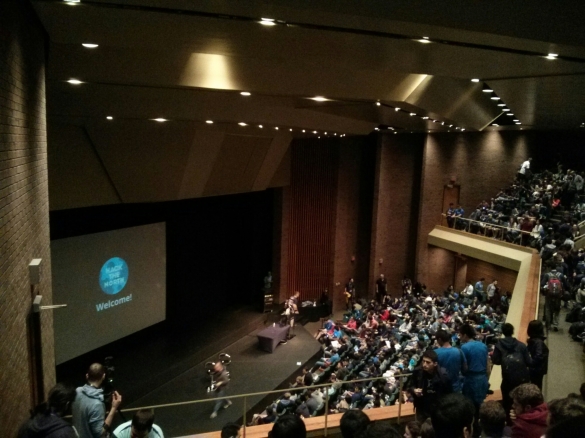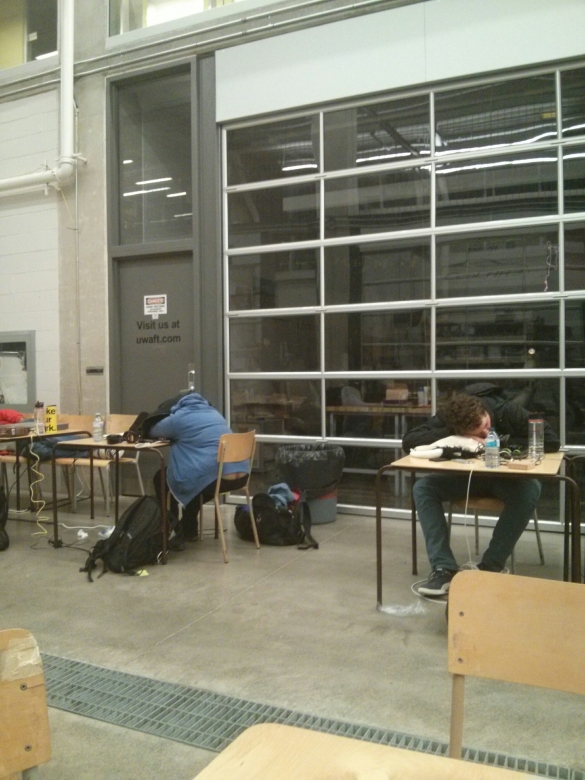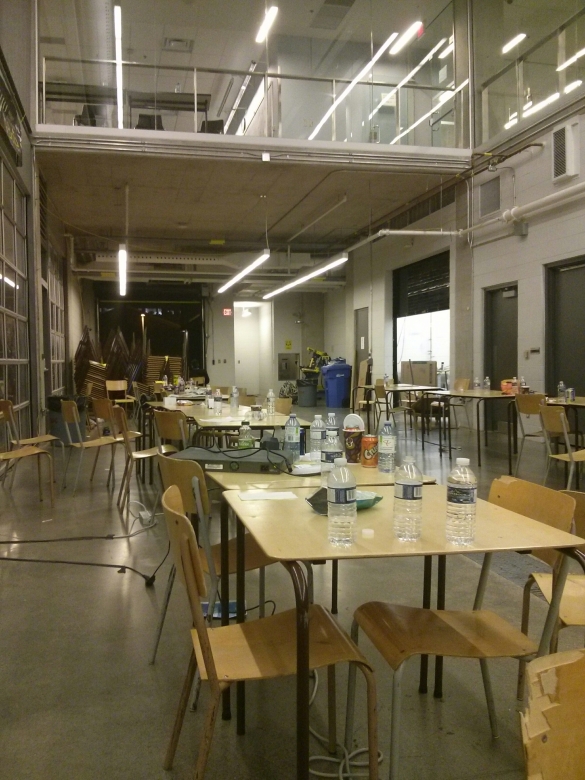This time last weekend, I was on the other side of Canada in Waterloo, ON, hacking away. Maybe it has something to do with the distance traveled to get there, but it seems like a long time ago. I almost feel like I’m moving backward taking this weekend easy (and by easy, I mean getting more than 6 hours of sleep total from Friday to Sunday).
Hack the North is Canada’s largest student hackathon and this year’s inaugural event held last weekend had about 1000 students attending from countries all across the world. Generous sponsorship meant flight tickets were significantly reimbursed 80%+ of the cost, and so students from as far away as Amsterdam and Shanghai were in attendance.
There wasn’t any specific theme to the event, other than to build something cool that worked – no one said as much but I surmise that’s the aim of every hackathon. Lots of cool hardware was available to work on as well, from Myos to Pebbles and Oculus Rifts.
Getting to the event from Vancouver was an event in itself, a crazy early start, then waiting at the airport on the other side for the shuttle to Waterloo, and then the trip on the shuttle itself. Who knew that the traffic in Toronto, where everyone flies into, would be so bad.
There was a little dinner left when we arrived and then we got to hear some amazing speakers open the event. We had Chamath Palihapitiya who was formerly in charge of growth at Facebook and is now in VC, starting the fund The Social+Capital Partnership He spoke about startups and gave realistic advice about what life in tech is like. Chamath was extremely confident and charismatic, and it’s easy to say that he is one of the best orators I’ve ever heard. Check out his talk here (the video is still not up but I’ll update this post when it is!).
The hacking started at midnight and my friend Daniel and I got to work building a travel optimization app. It uses Yelp’s API to get a list of attractions in a city and Routific’s routing optimization API to provide an efficient route to visit the attractions in a single day if one exists. A quick way for tourists to determine how much they can get the most bang for their buck on their vacation.
There were chips and soda aplenty to keep people powered through the event, and there was even a small sleeping area. Unfortunately the sleeping area wasn’t really too well organized, it was brightly lit and far too small so I guess they didn’t expect many hackers to sleep much during the event. Daniel and I ended up finding chairs in a random room on the Waterloo Campus on Saturday morning for a couple of hours of sleep.
Saturday night/Sunday morning was probably the most interesting. People were definitely starting to feel the burn by that point and this was the scene at 4am
Every team got a chance to pitch their app in 100 seconds in front of a selected group of the judges, so there was definitely something to aim for during the hackathon. It’s all a bit of a blur but I spent most of Sunday morning trying to finalize the general flow and look of the app – I am definitely not a designer.
In terms of the stack, we built our app using Angular and had a Rails back-end for interfacing with the various APIs. Neither of us had used Angular before so that definitely made the hackathon interesting to say the least. We figured if you can’t try out some new tech in a hackathon, when else can you!
One of the things we found is that Angular, a JavaScript front end framework, is very domineering. You either use it completely for the front end, or prepare for some unexpected behavior if you try to mix in some regular JavaScript in there. We definitely ended up finding ourselves in the latter position, as we moved to get things working even if that meant doing things in less than the Angular way.
Another thing I learned this weekend was about OAuth, an authentication protocol which we used to communicate with the Yelp API. Since it uses tokens and secret keys, it wasn’t possible to have just a front end, we needed a back-end as well to prevent exposing our keys. This is different from something like the Google Maps API which we used as a map and for geocoding in our app (since Yelp doesn’t always return an attraction’s latitude and longitude) where client exposed keys are OK.
By the time hacking stopped at 10am, I’d been up for more than 24 hours, with little sleep before that period(!), so I managed to get a quick nap before we pitched in front of the judges.
Our app lacked the design polish of other teams, but the judges found our app pretty interesting, as did the engineers from Yelp who we pitched to separately (main prize vs API specific prizes basically). I thought we did decently for a team of two who were using a different stack than normal and it was great to find out later that Yelp had awarded us the prize for best app to use their API at the event!
We are getting 4 leap motions between the two of us. I’ll make a post once those arrive in the mail! Definitely interested to see what can be done with the hardware. Hardware hacks are not something I’ve really explored before.
But yeah, what an experience. Daniel and I work at the same company as coop software engineers, Axiom Zen, and it was great that we got the Friday off to travel to the hackathon and that we got so much support from them. They were pretty stoked that we managed to bring home a prize as well, using an API from a company they are helping accelerate. It’s great to work somewhere which gets as excited about things like hackathons as you are.
So what next? Work is super busy, there’s always lots to do but I’m enjoying it – more on that soon. I saw some interesting apps built in Node.js at the hackathon so that’s on the agenda this weekend! I’ll post if I build anything half decent 🙂
And if you’re wondering how you can get involved in hackathons, ChallengePost is a great website to start off with. They list hackathons going on around the world, both offline and online.


